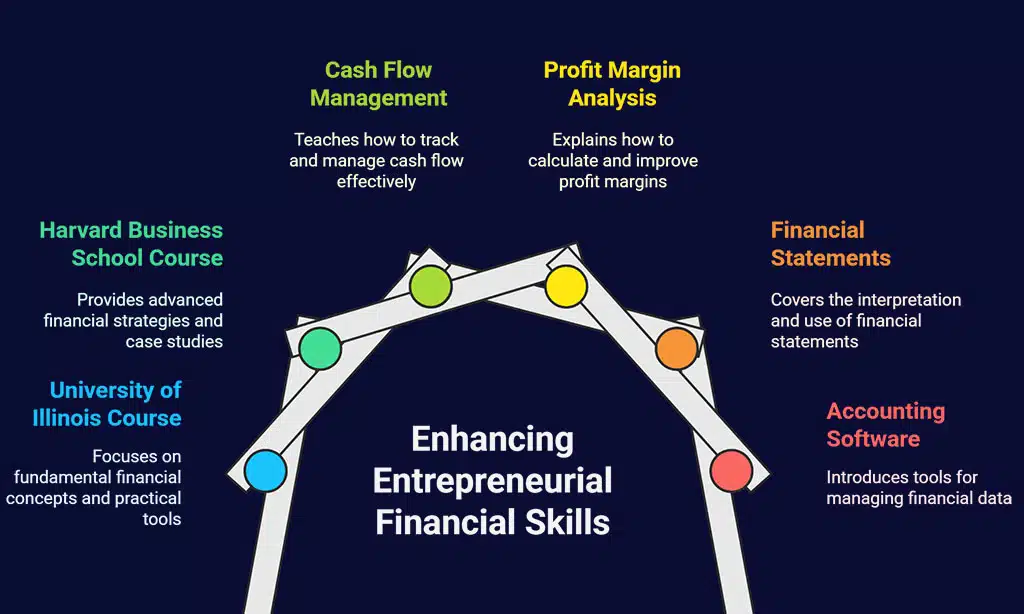New entrepreneurs often feel stuck. They juggle ideas, budgets, digital marketing and time management. They need clear steps on building a lean startup methodology, a solid business model and an entrepreneurial mindset.
Online business courses can fill that gap.
Did you know online learning platforms cost a fraction of a full MBA? You can master content marketing, digital marketing skills, SWOT analysis and business strategy without huge tuition.
This post lists ten courses in finance, branding and negotiation. It will help you spot market gaps, craft a business plan and launch with confidence. Your next step awaits.
Key Takeaways
- Entrepreneurs can choose free and paid courses: Udacity’s one-week “How to Build a Startup” (free), Y Combinator’s eight-week Startup School (free), edX’s six-week mindset course ($69), MIT’s six-week “Becoming an Entrepreneur” ($69), Wharton’s three-month strategy track ($2,050), and Harvard’s four-week “Entrepreneurship Essentials” ($1,850).
- Courses cover lean startup tools (Lean Canvas, MVP testing), SWOT and Porter’s Five Forces, content and digital marketing (Coursera’s Social Media Marketing at $49/month), branding (CalArts branding series), finance basics (University of Illinois at $49/month, Harvard’s Leading with Finance at $1,750), and sales and negotiation (Dale Carnegie at $2,195, University of Michigan at $49).
- Most programs run part-time (1–10 hours per week) and use hands-on labs, live office hours, peer reviews, and real case studies on Apple, Tesla, and Coca-Cola.
- Targeted skill building fills gaps in business model design, marketing, and finance. It cuts risks: 20% of new businesses fail in their first year and 14% collapse from poor marketing.
- Earning verified certificates from Harvard, Wharton, MIT, and University of Michigan adds credibility. Access to mentor networks and founder communities offers ongoing support.
Business Foundations and Startup Skills
A Business Model Canvas works like a GPS for your startup idea. Founders build a Lean Canvas in Google Docs, then launch a minimum viable product to gather real customer feedback.
How to Build a Startup (Udacity)
Udacity offers a free, one-week online business course on how to build a startup. This part-time class fits into any busy schedule. Lessons teach core business skills like sketching a business model, testing minimum viable products, and gathering customer feedback.
No verified certificate follows, but you gain real know-how fast.
Videos and quick quizzes guide each move, like a lean startup lab in your browser. Morning or evening sessions adapt to your pace. Lean Canvas and simple prototyping tools help you spot risks and refine ideas.
This class fires up your entrepreneurial mindset and feels more like a hands-on workshop than a lecture.
Startup School (Y Combinator)
Y Combinator offers a free, fast 8-week program that builds key start-up skills. Pixar and Airbnb execs lead lively lessons on lean planning and funding paths. This online course builds an entrepreneurial mindset while you use a business model canvas and test with customer feedback loops.
Entrepreneurs learn content marketing tips, business strategy, and lean tactics for real markets.
Students join live office hours, group chats, and one-on-one reviews for hands-on feedback. Each week ends with a mini project that tests your plan in real markets. As a bonus, you gain access to a huge network of founders and mentors on a top online learning platform.
Entrepreneurial Mindset Development
This section fires up your growth mindset with hands-on design thinking sprints and a strengths test. You’ll build grit, and sketch a startup blueprint.
Developing an Entrepreneurial Mindset: First Step Towards Success (edX)
edX offers a six week online business course with free audit and a $69 verified track. It explores core tools like a strategy map and planning templates. It covers lean startup methods, SWOT analysis, and customer feedback loops.
It shows how to write a solid business plan. It ties lessons to human resources basics and small business administration tips. It boosts digital marketing skills and lays out venture capital insight.
Learners spend one to three hours per week. They watch bite size videos and answer quick quizzes. The course uses real startup cases to spark ideas. Students roll up their sleeves and test ideas fast.
They learn to shape a marketing strategy and adjust plans with data. They gain an entrepreneurial mindset they can use right away.
Becoming an Entrepreneur (MIT)
MIT crafted a six-week online business course that builds entrepreneurial mindset and business skills. It demands one to three hours per week. Learners draft a lean startup plan, test ideas with customer feedback, and use Business Model Canvas.
The platform lets students audit the content for free.
Students can upgrade for $69 to earn a verified certificate. They practise market research, finance basics, and brand building. Participants explore basic accounting, inventory tips, and liability concerns.
Small business administration tools and SWOT analysis deepen understanding.
Business Strategy and Growth
Smart founders scan their market with Porter’s Five Forces or a quick SWOT check, and tap tools like Google Sheets or Tableau to track real numbers, not gut hunches. You can fire up your growth plan with tips from Wharton and Harvard pros, so keep reading for fresh tactics.
Business Strategy from Wharton – Competitive Advantage (Wharton School)
Wharton School offers an online course, Business Strategy from Wharton: Competitive Advantage. It costs $2,050 and runs three months at 3 to 4 hours each week. The course awards a verified certificate.
Participants build solid business skills during focused sessions.
Professors teach Porter’s Five Forces, SWOT analysis and value chain. They use real case studies on Apple and Tesla to show how firms gain an edge over competition. You learn to refine your business model and gather customer feedback.
These tools help startups plan for growth and outpace rivals.
Entrepreneurship Essentials (Harvard Business School)
Harvard Business School offers this online business course for $1,850 over four weeks. Students spend six to eight hours each week on an online learning platform. They gain core business skills while they build a business model.
This course ranks high among online business courses and fuels an entrepreneurial mindset.
Instructors use a business plan template and a strengths, weaknesses, opportunities, and threats review to teach business strategy. Modules cover customer feedback, income statements, and digital marketing skills.
Graduates earn a verified certificate to validate their new expertise.
Marketing and Branding Skills
You nail a brand voice that sticks like gum on a shoe, using content marketing tips and graphic design tricks. You then track social media marketing moves with Google Analytics and whip up eye-catching posts in Canva.
Social Media Marketing Specialization (Coursera)
Coursera hosts the Social Media Marketing Specialization as one of the top online business courses, at $49 per month, spread over 3 months, and an average of 10 hours per week. The program awards a verified certificate once you submit the final capstone.
Facebook Ads and Google Analytics show real campaign data, and you test marketing tool features in hands-on labs.
Students learn content marketing tactics, track consumer behavior trends, and launch marketing campaigns. The course also helps sharpen digital marketing skills and build solid time management habits for entrepreneurs and small business owners, all in clear, step-by-step modules.
Branding: The Creative Journey Specialization (California Institute of the Arts)
The course shows brand stories of Apple and Coca-Cola. It teaches design thinking for logos, color choices, and style. It guides you in content marketing and digital marketing skills.
It uses image editor software and vector toolsets for real projects. It works on a part-time, flexible schedule for busy founders.
The series mixes hands-on branding with a simple business plan twist. It invites customer feedback on your logo drafts and brand pitch. It builds your brand identity as you learn human resource management basics.
It runs on an online learning platform that anyone can join. It sparks creative ideas and keeps you on track.
Financial Knowledge for Entrepreneurs
Entrepreneurs must grasp cash flow and profit margin to dodge money traps. A course shows you how to read financial statements and use accounting software.
Fundamentals of Business Finance (University of Illinois)
Fundamentals of Business Finance (University of Illinois) stands out among online business courses. It explains assets, liabilities, and equity with clear steps. The program runs part-time, costs $49/month, and fits busy schedules.
Learners watch short videos, join forums, and build money-tracking spreadsheets on online learning platforms.
Instructors guide students through a sample business plan, map a balance sheet in Excel, and teach project management basics. You test pricing, calculate profit margins, and track cash flow in case studies.
This course pulls ideas from Eric Ries and David Sacks, and it boosts business skills and finances know-how fast.
Leading with Finance (Harvard Business School)
Harvard Business School offers Leading with Finance. The fee sits at $1,750. Ten lessons span six weeks. A verified certificate comes with completion. The course covers income statements, balance sheets, cash flow sheets, ratio analysis, NPV and IRR.
Students work with spreadsheet tools and simple case studies. Entrepreneurs craft solid business models and track business finances. This program stands out among online business courses.
Participants review real startup companies and test price scenarios. Instructors use charts and clear language. Learners run calculator exercises and value projects. They assess liquidity and profits fast.
The platform delivers lessons online. Busy users fit sessions into tight schedules. A Harvard link on your resume adds credibility and clout.
Sales and Negotiation Skills
Top sellers learn BATNA and shape a strong value proposition to win buyers. They log leads in HubSpot CRM and forecast revenue with Google Sheets.
Dale Carnegie Sales Training: Winning with Relationship Selling (Dale Carnegie)
Dale Carnegie offers its Sales Training as an online business course for $2,195. It explains buyer behavior and relationship-building techniques. The program shows how to track customer feedback with a CRM system and a professional network platform.
Learners pick up business skills in goal setting and business strategy. The mix of role play and real talk fields hard questions smoothly. A few hours in, you leave with fresh ideas on how to link empathy to revenue.
Successful Negotiation: Essential Strategies and Skills (University of Michigan)
Students pay $49 to enroll in nine weekly online modules. The University of Michigan offers this among top online business courses with part-time study and a flexible schedule. You learn key business skills like Best Alternative to a Negotiated Agreement and anchoring to win deals.
Role-play simulations in a video conferencing app and a negotiation plan template sharpen active listening and Zone of Possible Agreement.
You build confidence by closing mock contracts under time pressure. The course shows how to flag employment law pitfalls in agreements. Participants share real scenarios in small groups to refine tactics.
Learners end with a toolkit of charts, checklists and case studies to boost your next pitch.
Tips for Selecting the Right Course
Pick a course that fits like a glove to fill your gaps in business model design or digital marketing. Compare user ratings on MOOCs and test your skills with built-in quizzes in the learning management system.
Identify your skill gaps
Writers can map each task in a skill matrix. This simple tool shows where you shine and where you lag. You may find a shortfall in digital marketing skills or content marketing. A weakness might lurk in supply chain management or time management.
Fact shows 20% of businesses fail in their first year and 14% collapse from poor marketing. A clear view of gaps can aim your online business courses where you need them most.
Rate your talents with a Google Forms survey or a SWOT chart. Mentors or a CPA can give honest feedback on your gaps. Sites like Coursera and edX list courses on how to build a startup, on business model design, and on business strategy.
Consider free online courses from the opencourseware project or paid lessons from the University of Michigan or Michigan State University. Score each option on cost, time, and support to match your goals and boost your entrepreneurial mindset.
Consider course duration and cost
Small business owners can pick a quick session or a long program. Some online learning platforms host microclasses on digital marketing that last a few hours. Other courses, like a full business strategy track on Coursera or edX, may stretch for eight months.
Self-paced content marketing series let you learn at your own speed. Students can balance time management with busy schedules.
Tuition may range from no-cost options to $2,050 for top-tier offerings. Business skills classes from Harvard Business School often sit at the high end. Free courses on entrepreneurship essentials from an accelerator program and a MOOC provider let learners test concepts without a fee.
Budget-minded learners can pick a free session on Operations Management or a low-cost crash course on the small business administration website. Price tags can guide your choice as you craft your own business model.
Choose reputable platforms or institutions
Pick a platform with a solid track record. It must offer clear credentials, good reviews, real instructors. Top platforms like Coursera, edX, and Harvard Business School offer online business courses from top schools.
They cover key topics from business plan writing to digital marketing skills.
Many MOOCs on edX or Coursera run part-time. They stay flexible. The learning management system on each platform adds quizzes, peer work, video lectures. Harvard Business School Online uses real case studies on business strategy, finance and business valuation.
Free courses let you test quality before you commit. This step saves time and money.
Takeaways
Each course builds your digital marketing and finance know-how fast. You gain a strong business strategy sense from business school modules. Some classes arrive on edX, others from an online learning platform.
No more guesswork, just solid learning for busy founders. Your entrepreneurial mindset grows with each lesson.
FAQs
1. What online business courses should I take to build core skills?
Pick online business courses that match your interests. Focus on digital marketing skills, content marketing, and business strategy. These boost your time management and basic business skills.
2. Can these courses boost my entrepreneurial mindset and teach me to test a business model?
Yes. They guide you through the lean startup, brainstorming ideas, and gathering customer feedback.
3. Will I learn how to build a startup in these courses?
Definitely. Many classes walk you through how to build a startup. They show you how to craft a business plan and test your product idea fast.
4. Do these courses cover legal and admin tasks, like employment law and paying employees?
Yes. They give you the know how on employment law, intellectual property, small business administration, human resources management, and paying employees.
5. Where can I find free courses or top college options?
Check online learning platforms for free courses. You can learn from the University of Michigan or Michigan State University without a fee, or sign up for paid tracks.
6. Do I need an accountant or bookkeeper as I grow?
Yes. An accountant can guide you through taxes, and bookkeepers keep your ledgers tidy. That way, you can focus on growth.


































